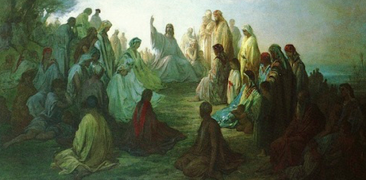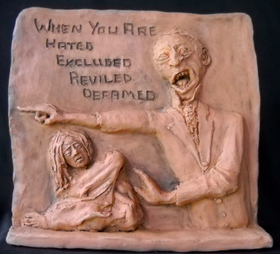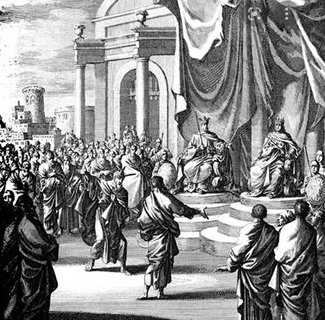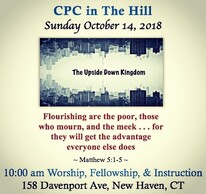 This morning on the Sidewalk and at Sunday service tomorrow, I begin a series through the prophet Jeremiah’s book. What got the ball rolling in my thought process—on why did I pick Jeremiah as the next series—was a question I had been asking since my alma mater’s (Crown College’s, aka St. Paul Bible College’s) 100th anniversary’s gathering a few years ago. At one of the weekend’s events, they gathered together the previous Crown presidents for a Q&A. The final question was, “What is one thing that isn’t being taught at Crown College that needs to be taught at Crown College?” The last answer came from the oldest and most senior of the former Crown College presidents (he was back in the 70s; I was there ’81-’84), Dr. Grubbs, a kindly and wise Christian & Missionary Alliance elder statesman; he said: “How the students will endure persecution.” This stuck with me. For years, now, his answer has been festering in my heart and thoughts during my time here as a pastor in the Hill: Am I teaching my flock how to endure persecution? Do I even know how to teach them how to endure persecution? So, I have been asking myself, “How do I teach my CPC in The Hill flock to endure persecution?” As I was finishing up my sermon series through Galatians, I had been praying, “What’s next?” The Book of Jeremiah seemed to be what was being presented—almost everywhere I turned (books and material I was reading; podcasts I was listening to; casual conversations) pointed to Jeremiah. So, I am preaching through Jeremiah—both to listen for myself and to help my people reflect on that question: “How does a Christian, a church, endure persecution?” And then, hopefully, answer the question for myself, “How, as a pastor, do I train/teach my CPC in The Hill flock to endure persecution? How?” I think Jeremiah will help answer all these related questions. *We will get to what “persecution” is in the coarse of the series.
0 Comments
 If you caught this yesterday, my sermon text for Sunday is Galatians 4:8-20. A text that reveals Paul’s heart for the Galatian house churches and his perplexity (v. 20) over why the Gentile Galatians would even consider adopting—even more so, getting circumcised and identifying with--the Law and, thus, old age, living in exile, under the covenant curse Israel current position before God? Breaks his heart (as this text reveals). In this section, Paul also tells the Galatian house churches what his goal is. This is found in verse: “my little children, for whom I am again in the anguish of childbirth until Christ is formed in you!” (V. 19). Most English readers take the “you” as “you individuality,” assuming Paul means “I desire to see each Christian looking like, acting like Jesus.” While this is a good thing of course—and would be if that’s what Paul meant here. But it begs the question: What does looking like and acting like Jesus look like? And, is Paul referring to the individual Christian? Here in this text, not only is the “you” plural, it is a part of a prepositional phrase: ἐν ὑμῖν (“among you,” i.e., among you, the house churches in Galatia). So, Paul is saying, “My little children [those whom I led to Christian among the house churches in Galatia], for whom I am again in the anguish of childbirth until Messiah is formed among you.” It is so much more preferable to take the “in” (of most English translations] as “among,” a perfectly reasonable rendering of what Paul wrote. Now we should ask what does Paul mean by formed “among” the house churches in Galatia? The apostle has already told us in chapter 3. “For as many of you as were baptized into Christ have put on Christ. There is neither Jew nor Greek, there is neither slave nor free, there is no male and female, for you are all one in Christ Jesus” (vv. 27-28). Since the Law has fulfilled its purpose (which is why it was temporary and why it is so perplexing you--Galatian, Gentile Christians--would even consider circumcising yourselves to this Law), additionally, you all have been baptized into Christ, listen, and now there is neither Jew nor Gentile; there is neither slave nor free; there is neither male nor female—you all are in Christ and you all are Abraham’s offspring, heirs according to the promise [given to Abraham].” This is what is means to have Christ formed among them, namely churches that present “neither Jew nor Greek, there is neither slave nor free, there is no male and female” (3:28); house churches where “you are all one in Christ Jesus” (v. 28d). This observation makes me think that when our churches are majority peer-like congregations, I wonder if we are then returning to the elementary principles that govern the world—or, as Paul says in our text, we have returned to idol-worship. Wasted Rough Cut: Listening to Jesus' Beatitudes (in Luke) and not robbing the poor of their power.1/16/2022 *The following is a set of sermon prep-notes and ideas for my sermon on Jesus' Beatitudes as Luke presents them in his Gospel.  I am amazed, and saddened as well, the lengths Christians, even commentators, will go to read out the “poor” in a vast majority of Bible texts that are so clear and should be necessarily inferred as actual poor. This robs this text in Luke 6 of its gospel-transforming-power, especially with regard to Jesus’ words in the Beatitudes. In Luke 6:20b we read, “Blessed are you who are poor, for yours is the kingdom of God.” (Below I offer my own translation of this verse.) One would think a learned degree is not necessary to hear Luke sets Jesus’ reference to the “poor” in contrast to his equally disturbing reference to the “rich” in what is obviously a paralleled statement in Luke 6:24: “But woe to you who are rich, for you have received your consolation.” In fact, it is much harder to spiritualize Jesus’ reference to the “rich” than it is his reference to the “poor.” This can be seen by the fact hardly anyone does. Luke’s Gospel is filled with such contrasting of the poor and the rich in Jesus’ teachings and in forthcoming parables that we cannot escape something about actual “rich” and actual “poor” is afoot. For example, in Luke 16:20, Jesus compares the poor beggar with the rich man who disregards the beggar only to discover the poor beggar is the one who is blessed in heaven while he was filled (satisfied) on earth: “but now he [the poor beggar] is comforted here [after death], and you [the rich man] are in anguish [after death]” (16:25b). Certainly, given the wider narrative context, there is a link (i.e., a clear and necessary inference) between the “Blessed are . .” and the “But woe to you . . .” contrasted sets in the Luke 6 Beatitudes. This poor/rich contrast is also seen in Luke 21:2, when Luke/Jesus refers to a “poor widow” in contrast to the rich and the pompous pharisees. Later, in Luke 7:22, the proof that Jesus is the messiah and that the kingdom of God had arrived is given by observing what was happening in Jesus’ ministry: “And he answered them, ‘Go and tell John what you have seen and heard: the blind receive their sight, the lame walk, lepers are cleansed, and the deaf hear, the dead are raised up, the poor have good news preached to them.’” Again, in Jesus’ parable of the great feast in Luke 14, the rich are instructed to not invited those who can repay, but invite the poor who cannot repay–again, here is that link to the Luke 6 Beatitudes. (There is also a narrative link to the forthcoming poor beggar/rich man scene in Luke 16 as well.) “But when you give a feast, invite the poor, the crippled, the lame, the blind, and you will be blessed, because they cannot repay you. For you will be repaid at the resurrection of the just” (Luke 14:13). Even when the context and the clear narrative meaning of the text is referencing the actual poor there is a tendency to read out the poor and read in anyone who is “poor of heart.” That certainly keeps the rich satisfied and the poor, well, still poor. This disallows the obvious social/institutional system-contrast Luke has already set up for us in his introduction, that is Mary’s song: he has brought down the mighty from their thrones and exalted those of humble estate; he has filled the hungry with good things, and the rich he has sent away empty (Luke 1:52-53). Thus, restoring the gospel-transforming-power we have robbed from the Beatitudes by reading out the poor from this text.  Luke 6:20b: Μακάριοι οἱ πτωχοί, ὅτι ὑμετέρα ἐστὶν ἡ βασιλεία τοῦ θεοῦ. ESV: “Blessed are you who are poor, for yours is the kingdom of God.” My wooden translation: “Flourishing*, the poor (the marginal and powerless), because allotted to you** is the kingdom of God.” Smoothed out: “Flourishing is the marginal and powerless, because to you—the marginal and powerless—is allotted the Kingdom of God.” I try to pay attention to how early church writers render texts of Scripture. Tertullian (155 AD–220 AD) gave Luke 6:20 and this Beatitude the latin beati mendici—“Blessed are the needy,” or “Blessed are the beggars.” He is not the only one who translated the word πτωχοί as “beggar.” While it (i.e., “πτωχοί,” poor) can and probably does simply mean the “poor” (its detonated meaning), its connotative meaning gives a more powerful nuance. For example: The word we translate “poor,” πτωχοί is vivid: one who crouches (as in shamed to be seen) and cringes (as in cowering in the presence of others), thus it is often used of “beggars.” No doubt it carries the concrete reference to someone who is needy, someone who has no power, someone we typically call “marginal” and powerless in society, and in the ancient world one who would have been called “not-or sub-human.” The two times Luke uses this word associated with a particular person are the beggar named Lazarus (being contrasted with the rich man who had everything and disregarded Lazarus, 16:20) and the poor widow vs. the rich/the duplicitous scribes (21:2)—can’t you see what Luke is doing between the Beatitude promise/affirmations and the wider story in his Gospel narrative? There are more of these throughout the Gospel (see chapter 14 for example). The word we typically render the “poor” (πτωχοί) is better understood by how it is used. While it is certainly can be used metaphorically to mean humble,*** or as a Christian virtue, or still better, more simply, as not-arrogant, there is a reason why this word can be used this way. The word has a concrete meaning range of someone without economic means, who is marginal and powerless–again, this is why the word “beggar” isn’t a stretch and certainly fits Luke’s other uses of the word throughout his Gospel. And, it also fits the extremes of the power/powerlessness contrasts that Luke uses to describe the arrival of Messiah and the teachings/parables Jesus uses throughout Luke’s Gospel: beggar (the least and the most without power) vs. the rich (or the mighty, those who have the resources but do not share with the poor, and/or those who do only to/for those who can pay back). You can see how Luke has shaped his Gospel and why it seems a necessary inference to take “the poor” in the Beatitude as exactly that, the poor as in the marginal and powerless. *”Flourishing” is a far better translation for Μακάριοι than either “blessed” or “happy.” **The “you” is a bigger word than the simple pronoun σύ (you), but as you can see is the word ὑμετέρα, which carries the idea of “allotted to you” or “possessed by you.” Split hairs which nuance, but since this is God’s action or promise I lean toward the nuance of “allotted.” ***In the Greek world, the nuanced meaning of “humble” or as a Christian virtue is a much later connotative meaning given this word, πτωχοί, and should not be read back in to how Luke is using the “poor” / “rich” contrast and comparison.  “Blessed are you when people hate you and when they exclude you and revile you and spurn your name as evil, on account of the Son of Man!” (Luke 6:22). While I agree these words are directed at disciples, who will become Jesus’ representatives (probably the meaning behind “on account of the Son of Man,” v. 22e), the description here plays double-duty. Obviously (because we have the whole of the NT to give us fuller understanding) just because one is “poor” or “hungry” or weeping (probably all three is one group), this does not mean they do not need to be born again or qualifies them as automatically born again (something that needs to happen in order for sins to be forgiven, be justified before God, and gain eternal life). Nonetheless, it should be pointed out that “crowd” who came for healing and exorcism would not have been the ones honored nor socially accepted in either the Greco-Roman world nor the Jewish world for that matter. They'd have been the truly marginalized, rejected, and considered sub-human. “. . . a great multitude of people from all Judea and Jerusalem and the seacoast of Tyre and Sidon, who came to hear him and to be healed of their diseases. And those who were troubled with unclean spirits were cured” (Luke 6:17c–18). They would have too easily identified with being hated, being excluded (separated, marginalized, rejected, avoided, ostracize), being reviled, and shunned. The dirty, shameful words trigger: diseased and possessed of unclean spirits. This was their lot, their place in the social castes and institutional systems of the world. The “apostles” that were just chosen (6:13-16), along with the “great crowd of his disciples” (v. 17b), whom the sermon is directed (v. 20), while the larger crowd was listening in—the teaching was very public (and outdoors I might point out!)—they would be as marginalized as the ones who came for healing and who troubled with unclean spirits. Jesus’ appointed representatives (the apostles) and followers (the wider crowd of disciples) would be the poor, the hungry, and those weeping—everything would be turned on its head and the world, its social structure and institutions would hate, marginalize, revile, and spurn those who were truly the blessed, that is the apostles and disciples of Jesus who followed Him and proclaimed this teaching—all on account of being the representatives of the Son of Man, those whom Jesus was reproducing Himself in the world. Yet it would be to them the kingdom belongs, their stomachs would be full (satisfied), and fulled with joy. The appearance of Messiah Jesus and the proclamation of the Gospel—as Jesus’ inaugural sermon indicated (Luke 4:18-19; cf. Isaiah 61:1-2 and 58:6-7)—changes everything about how the systems and structures of this world work (cf. Luke 1:51-53). This is what the beatitudes indicate and mean–and how they should be applied. However, we have traded this all away by making the church (and by that I mean churches and their institutionalized systems) reproduce the world in everything from measures of success to leadership and training to evangelism and (sadly) in our ways of doing and measuring being missional. Discipleship, too often, mimics how the world works rather than what the Beatitudes display.  Lastly, discipleship is not one size fits all. The way Luke has presented Jesus’ Beatitudes is more to expose the structural and systemic, institutionalized empire (Rome-centered, adamic natured) way of defining who is and who is not blessed, who is and who is not honored, who is and who is not fully (or at all) human. What divides humanity. And, addresses the danger of using the world’s way of addressing the issues of poverty and affluence. Take the poor out of Jesus’ reference to the poor and this is lost. This–that is, the Beatitudes are not about “salvation” (that is getting into the Kingdom of God), but about what the new community of God looks like, how it’s system, if you will, works. And this means applying discipleship somewhat (not entirely, but in some specifics) differently to rich disciples and poor disciples. The way to blessing (i.e., kingdom flourishing) is not the way of the world–it is a wholly other way (or as the title of a book I am reading puts it, not the way of the dragon, but the way of the Lamb). Christianity, that is our faith in Christ and our relationship to the church, is not a pathway to success (that is being one of the “rich”). And, our present power granted to us by our place or status in the social structure and current institutions no longer defines us and our neighbors. If one is among the “rich” one best rethink their relationship to the poor and adjust appropriately. Other Sermon on the Plain Wasted Blog thoughts
Sermon prep for this Sunday’s message from 2 Chronicles 18 . . . Ahab, Jehoshaphat, the 400 false-prophets, and Micaiah . . . the dangers of giving the true Word from the Lord . . .  2 Chronicles 18:25-27 And the king of Israel said, “Seize Micaiah and take him back to Amon the governor of the city and to Joash the king's son, and say, ‘Thus says the king, Put this fellow in prison and feed him with meager rations of bread and water until I return in peace.’” And Micaiah said, “If you return in peace, the Lord has not spoken by me.” And he said, “Hear, all you peoples!” These words here have always struck me.
Impressed something important on me. Especially as a preacher. They seem rather dangerous. I have been—in the last 40+ years as a Christian—around those (way too many) who either have been “given a Word from God” or have been the giver of “a Word from God.” Not just preachers either, but also among friends, just lay-folk, or just one to another. This has always struck me as well, as very arrogant to say the least, a way to show power over someone or affirm power over others, or at the most, very dangerous (probably all the above). I have never once, however, heard someone “giving that Word” say what Micaiah said at the end of his scene before Ahab: “If you return in peace, the Lord has not spoken by me.” Never. In most cases, the word given has no risks for the giver. None. Yet, as a giver of a Word—at least on Sunday mornings and also in advise and counsel—I need to approach with caution and a willingness to be at risk in someway and be willing to pay a price if necessary. Some make riches and fame off their preaching. I have not been so privileged. But, I do hope I am closer to Micaiah in my willingness and intention to give of God’s Word to others no matter the cost. Hey, did you ever notice that there is no mention of Micaiah getting out of that prison cell after the battle and after Ahab was killed and died . . . as far as we know from the story, remained in that cell . . . that is the risk of giving a (real, true) Word from God, as it should be . . . I pray I am willing and, when presented the opportunity, enduring . . . Read my previous Wasted Sermon Prep notes on 2 Chronicles 18 . . . >>  Since I started, even as an interim, in 2014, the first two Sundays of the year focused on committing ourselves to reading our Bible's more and being more intentional in our daily prayer lives. This Sunday–the emphasis on reading our Bibles more–I am slightly taking a different tack. I am preaching from one of my favorite OT stories on Sunday, 2 Chronicles 18–the focus is listening to God's Word. 2 Chronicles 18 presents a scene where the kings of Israel (Ahab) and of Judah (Jehoshaphat) are sitting court together in the Northern Kingdom seeking advice from Ahab's advisors, so-called prophets of the king's court. The 400 fake prophet-advisors to king Ahab were all affirming the king would defeat Syria in battle: "Go," they said. Actually, they were sending him to his death. All 400 of them. The 401st prophet-advisor, Micaiah, is summoned. Ahab knows full well that he’d get the truth, the word from the Lord, but a word he would hate. Micaiah comes before king Ahab, yet, he doesn’t tell him not to go, but simply tells him soon Israel will be without a king, without a shepherd to guide the people. In this way, the true prophet with the true Word foretells what is about to happen when the king does what the 400 fable-prophets all affirm. The Word actually speaks to the issue of Ahab's heart. What Micaiah was foretelling—aka, the word of the Lord—was that Ahab would listen to his fake-prophets and get killed in Battle. So many of us want a “word” that affirms what we want to do already—not necessarily specifically to a certain thing, but as to our pride, our peer-affirmation, what’s prosperous or safe, what makes us bigger, better, more awesome in the eyes of others. Yet, the Word we need from God is that Word that breaks our sin and causes us to return to the God that makes covenant, that restores our life--other people's lives actually, since it is the people in this story that will be affected by the king's death. The whole incident with Ahab, the 400 false-prophets and Micaiah was for the benefit of Jehoshaphat and later readers (like us), especially future kings–the story reminded that it is vital to remain faithful to the covenant, listen to the original ten-words and the covenant stipulations, and to not be entangled with foreign affairs (that is, making covenant with ungodly foreign, covenant-breaking nations). In part, the message to Jehoshaphat was clear and understood for the following chapters he enacts reforms to bring the southern kingdom back into conformity to the covenant with YHWH (thus, strengthening what I have proposed here regarding the Chronicler's intention). So, the questions remains—what do we hear in the story? Do we continue seeking affirmation for actions that will build, sustain, and/or promote our desires, greed, pride, status? Or, do we seek God’s already revealed Word that humbles us and makes for a relationship with God on his terms? Whom do we identify with? Ahab? Jehoshaphat? On the one hand we should recognize we are like Ahab--thus humbling ourselves before God--and on the other hand, we are to be like Jehoshaphat in trusting God and refocusing ourselves on God's covenant so that others would benefit (again, this is in this story and in the following chapters!) That’s the message for the New Year. Continued sermon prep stream of Pastor Chip's consciousness . . . >>  Working on the sermon for this coming Sunday morning when I noticed a dynamic parallel between the first line of the Beatitudes and Isaiah 61:1: “Blessed are the poor in spirit, for theirs is the kingdom of heaven” (Matthew 5:3). “to bring good news to the poor; he has sent me to bind up the brokenhearted” (Isaiah 61:1b) Many have noted that the Sermon on the Mount as a whole is fulfillment of or stems from the Isianic promises and in particular Isaiah 61. Matthew's Sermon on the Mount is his version of Luke's use of Isaiah 61 in Luke 4:16-19. You can see the connection between "poor in spirit" and Isaiah's parallelism of "to the poor" and "to bind up the brokenhearted." |
AuthorChip M. Anderson, advocate for biblical social action; pastor of an urban church plant in the Hill neighborhood of New Haven, CT; husband, father, author, former Greek & NT professor; and, 19 years involved with social action. Archives
February 2024
Categories
All
|
Pages |
More Pages |
|
 RSS Feed
RSS Feed